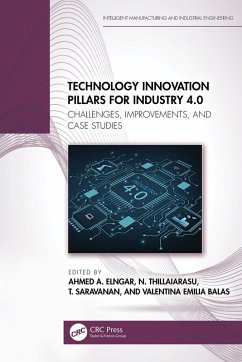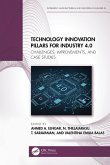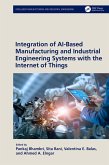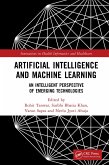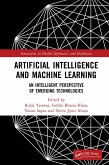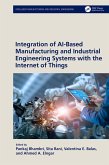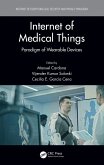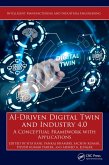Technology Innovation Pillars for Industry 4.0 (eBook, PDF)
Challenges, Improvements, and Case Studies
Redaktion: Elngar, Ahmed A.; Balas, Valentina Emilia; Saravanan, T.; Thillaiarasu, N.
52,95 €
52,95 €
inkl. MwSt.
Sofort per Download lieferbar

26 °P sammeln
52,95 €
Als Download kaufen

52,95 €
inkl. MwSt.
Sofort per Download lieferbar

26 °P sammeln
Jetzt verschenken
Alle Infos zum eBook verschenken
52,95 €
inkl. MwSt.
Sofort per Download lieferbar
Alle Infos zum eBook verschenken

26 °P sammeln
Technology Innovation Pillars for Industry 4.0 (eBook, PDF)
Challenges, Improvements, and Case Studies
Redaktion: Elngar, Ahmed A.; Balas, Valentina Emilia; Saravanan, T.; Thillaiarasu, N.
- Format: PDF
- Merkliste
- Auf die Merkliste
- Bewerten Bewerten
- Teilen
- Produkt teilen
- Produkterinnerung
- Produkterinnerung

Bitte loggen Sie sich zunächst in Ihr Kundenkonto ein oder registrieren Sie sich bei
bücher.de, um das eBook-Abo tolino select nutzen zu können.
Hier können Sie sich einloggen
Hier können Sie sich einloggen
Sie sind bereits eingeloggt. Klicken Sie auf 2. tolino select Abo, um fortzufahren.

Bitte loggen Sie sich zunächst in Ihr Kundenkonto ein oder registrieren Sie sich bei bücher.de, um das eBook-Abo tolino select nutzen zu können.
Technology Innovation Pillars for Industry 4.0: Challenges, Improvements, and Case Studies discusses the latest innovations in the application of technologies to Industry 4.0 and the nine pillars and how they relate, support, and bridge the gap between the digital and physical worlds we live in.
- Geräte: PC
- mit Kopierschutz
- eBook Hilfe
Andere Kunden interessierten sich auch für
![Technology Innovation Pillars for Industry 4.0 (eBook, ePUB) Technology Innovation Pillars for Industry 4.0 (eBook, ePUB)]() Technology Innovation Pillars for Industry 4.0 (eBook, ePUB)52,95 €
Technology Innovation Pillars for Industry 4.0 (eBook, ePUB)52,95 €![Integration of AI-Based Manufacturing and Industrial Engineering Systems with the Internet of Things (eBook, PDF) Integration of AI-Based Manufacturing and Industrial Engineering Systems with the Internet of Things (eBook, PDF)]() Integration of AI-Based Manufacturing and Industrial Engineering Systems with the Internet of Things (eBook, PDF)52,95 €
Integration of AI-Based Manufacturing and Industrial Engineering Systems with the Internet of Things (eBook, PDF)52,95 €![Artificial Intelligence and Machine Learning (eBook, PDF) Artificial Intelligence and Machine Learning (eBook, PDF)]() Artificial Intelligence and Machine Learning (eBook, PDF)52,95 €
Artificial Intelligence and Machine Learning (eBook, PDF)52,95 €![Artificial Intelligence and Machine Learning (eBook, ePUB) Artificial Intelligence and Machine Learning (eBook, ePUB)]() Artificial Intelligence and Machine Learning (eBook, ePUB)52,95 €
Artificial Intelligence and Machine Learning (eBook, ePUB)52,95 €![Integration of AI-Based Manufacturing and Industrial Engineering Systems with the Internet of Things (eBook, ePUB) Integration of AI-Based Manufacturing and Industrial Engineering Systems with the Internet of Things (eBook, ePUB)]() Integration of AI-Based Manufacturing and Industrial Engineering Systems with the Internet of Things (eBook, ePUB)52,95 €
Integration of AI-Based Manufacturing and Industrial Engineering Systems with the Internet of Things (eBook, ePUB)52,95 €![Internet of Medical Things (eBook, PDF) Internet of Medical Things (eBook, PDF)]() Internet of Medical Things (eBook, PDF)51,95 €
Internet of Medical Things (eBook, PDF)51,95 €![AI-Driven Digital Twin and Industry 4.0 (eBook, PDF) AI-Driven Digital Twin and Industry 4.0 (eBook, PDF)]() AI-Driven Digital Twin and Industry 4.0 (eBook, PDF)52,95 €
AI-Driven Digital Twin and Industry 4.0 (eBook, PDF)52,95 €-
-
-
Technology Innovation Pillars for Industry 4.0: Challenges, Improvements, and Case Studies discusses the latest innovations in the application of technologies to Industry 4.0 and the nine pillars and how they relate, support, and bridge the gap between the digital and physical worlds we live in.
Dieser Download kann aus rechtlichen Gründen nur mit Rechnungsadresse in A, B, BG, CY, CZ, D, DK, EW, E, FIN, F, GR, HR, H, IRL, I, LT, L, LR, M, NL, PL, P, R, S, SLO, SK ausgeliefert werden.
Produktdetails
- Produktdetails
- Verlag: Taylor & Francis eBooks
- Seitenzahl: 180
- Erscheinungstermin: 31. Juli 2024
- Englisch
- ISBN-13: 9781040049778
- Artikelnr.: 72271396
- Verlag: Taylor & Francis eBooks
- Seitenzahl: 180
- Erscheinungstermin: 31. Juli 2024
- Englisch
- ISBN-13: 9781040049778
- Artikelnr.: 72271396
- Herstellerkennzeichnung Die Herstellerinformationen sind derzeit nicht verfügbar.
Dr. Ahmed A. Elngar is an Associate Professor of Computer Science at the Faculty of Computers and Artificial Intelligence, Beni-Suef University, Egypt. As well as an Associate Professor of Computer Science at the College of Computer Information Technology, American University in the Emirates, United Arab Emirates, and an Adjunct Professor at the School of Technology, Woxsen University, India. He is the Founder and Head of the Scientific Innovation Research Group (SIRG) and the Director of the Technological and Informatics Studies Center (TISC), Faculty of Computers and Artificial Intelligence, Beni-Suef University. Dr. Elngar has more than 106 scientific research papers published in prestigious international journals and over 25 books covering such diverse topics as data mining, intelligent systems, social networks, and smart environment. Dr. AE is a collaborative researcher and is a member of the Egyptian Mathematical Society (EMS) and the International Rough Set Society (IRSS). His other research areas include the Internet of Things (IoT), Network Security, Intrusion Detection, Machine Learning, Data Mining, Artificial Intelligence, Big Data, Authentication, Cryptology, Healthcare Systems, and Automation Systems. He is an Editor and Reviewer of many international journals around the world, and he has won several awards including the Young Researcher in Computer Science Engineering, from Global Outreach Education Summit and Awards 2019, in Delhi, India. He also won the Best Young Researcher Award (Male) (Below 40 years), Global Education and Corporate Leadership Awards. Dr. N. Thillaiarasu currently is working as an Associate Professor at the School of Computing and Information Technology, REVA University, Bengaluru. He has served as an Assistant Professor at Galgotias University, Greater Noida, and has worked as an Assistant Professor in the Department of Computer Science and Engineering, SNS College of Engineering, Coimbatore. He obtained his B.E. in Computer Science and Engineering, from Selvam College of Technology and his M.E. in Software Engineering, from Anna University Regional Center, Coimbatore. He received his Ph.D. degree from Anna University, Chennai, and has published more than 25 research papers in refereed, Springer, and IEEE Xplore conferences. Dr. Thillaiarasu has organized several workshops, summer internships, and expert lectures for students and has worked as a session chair, conference steering committee member, editorial board member, and reviewer for Springer Journal and IEEE conferences. His areas of interest include Cloud Computing, Security, IoT, and Machine Learning. Dr. T. Saravanan graduated with a B.E degree in Computer Science and Engineering from Selvam College of Technology, Anna University, Chennai, he has an M.E degree in Network Engineering from Anna University Regional Center, Coimbatore, and a Ph.D. degree in Information and Communication Engineering from Anna University, Chennai, India. He has 10 years of teaching experience and has published many SCI papers, Scopus papers, book chapters, lecture notes, and Indian patents. His research interests include Computer Networks, Fuzzy logic, and Wireless Sensor Networks. Dr. Valentina E. Balas is currently a Full Professor in the Department of Automatics and Applied Software at the Faculty of Engineering, "Aurel Vlaicu" University of Arad, Romania. She holds a Ph.D. in Applied Electronics and Telecommunications from the Polytechnic University of Timisoara. Dr. Balas is the author of more than 300 research papers in refereed journals and international conferences. Her research interests include Intelligent Systems, Fuzzy Control, Soft Computing, Smart Sensors, Information Fusion, and Modeling and Simulation. She is the Editor-in-Chief of the International Journal of Advanced Intelligence Paradigms (IJAIP) and the International Journal of Computational Systems Engineering (IJCSysE). She is also a member of the Editorial Board of several national and international journals. Dr. Balas is the Director of the Intelligent Systems Research Centre and the Director of the Department of International Relations, Programs, and Projects at Aurel Vlaicu University of Arad. Dr. Balas has participated in many international conferences as an organizer, honorary chair, session chair, and member in Steering, Advisory, and on the international program committees.
1. Role of Artificial Intelligence in Telecommunication Systems: A
Healthcare Perspective. 2. An Intelligent System Utilizing Bipolar Fuzzy
Logic for Ensuring Semantic Interoperability and Privacy Preservation in
Healthcare Systems. 3. Graph Optimizations in Neural Networks by ONNX
Model. 7.Convolutional Neural Network Architecture for Accurate Plant
Classification. 5. Big Data Visualizing with Augmented and Virtual Reality:
Challenges and Research Agenda. 6. Mathematical Model for Service-Selection
Optimization and Scheduling in Cloud Manufacturing Using Sub-Task
Scheduling With Fuzzy Inference Rule. 7. Social Media Initiatives through
IoT to Link the Bridge between Industrial Demands with Higher Education
Millennial Students through Experience Learning. 8. Analyzing Consumer
Product Feedback Dynamics with Confidence Intervals. 9. Amplifying the
Effectiveness of a Learning Management System: Exploring the Impact of
NEP-Compliant Curriculum Changes on Higher Education Institutions. 10. The
Future of Immersive Experience: Exploring Metaverse Application Development
Technologies and Tools.
Healthcare Perspective. 2. An Intelligent System Utilizing Bipolar Fuzzy
Logic for Ensuring Semantic Interoperability and Privacy Preservation in
Healthcare Systems. 3. Graph Optimizations in Neural Networks by ONNX
Model. 7.Convolutional Neural Network Architecture for Accurate Plant
Classification. 5. Big Data Visualizing with Augmented and Virtual Reality:
Challenges and Research Agenda. 6. Mathematical Model for Service-Selection
Optimization and Scheduling in Cloud Manufacturing Using Sub-Task
Scheduling With Fuzzy Inference Rule. 7. Social Media Initiatives through
IoT to Link the Bridge between Industrial Demands with Higher Education
Millennial Students through Experience Learning. 8. Analyzing Consumer
Product Feedback Dynamics with Confidence Intervals. 9. Amplifying the
Effectiveness of a Learning Management System: Exploring the Impact of
NEP-Compliant Curriculum Changes on Higher Education Institutions. 10. The
Future of Immersive Experience: Exploring Metaverse Application Development
Technologies and Tools.
1. Role of Artificial Intelligence in Telecommunication Systems: A
Healthcare Perspective. 2. An Intelligent System Utilizing Bipolar Fuzzy
Logic for Ensuring Semantic Interoperability and Privacy Preservation in
Healthcare Systems. 3. Graph Optimizations in Neural Networks by ONNX
Model. 7.Convolutional Neural Network Architecture for Accurate Plant
Classification. 5. Big Data Visualizing with Augmented and Virtual Reality:
Challenges and Research Agenda. 6. Mathematical Model for Service-Selection
Optimization and Scheduling in Cloud Manufacturing Using Sub-Task
Scheduling With Fuzzy Inference Rule. 7. Social Media Initiatives through
IoT to Link the Bridge between Industrial Demands with Higher Education
Millennial Students through Experience Learning. 8. Analyzing Consumer
Product Feedback Dynamics with Confidence Intervals. 9. Amplifying the
Effectiveness of a Learning Management System: Exploring the Impact of
NEP-Compliant Curriculum Changes on Higher Education Institutions. 10. The
Future of Immersive Experience: Exploring Metaverse Application Development
Technologies and Tools.
Healthcare Perspective. 2. An Intelligent System Utilizing Bipolar Fuzzy
Logic for Ensuring Semantic Interoperability and Privacy Preservation in
Healthcare Systems. 3. Graph Optimizations in Neural Networks by ONNX
Model. 7.Convolutional Neural Network Architecture for Accurate Plant
Classification. 5. Big Data Visualizing with Augmented and Virtual Reality:
Challenges and Research Agenda. 6. Mathematical Model for Service-Selection
Optimization and Scheduling in Cloud Manufacturing Using Sub-Task
Scheduling With Fuzzy Inference Rule. 7. Social Media Initiatives through
IoT to Link the Bridge between Industrial Demands with Higher Education
Millennial Students through Experience Learning. 8. Analyzing Consumer
Product Feedback Dynamics with Confidence Intervals. 9. Amplifying the
Effectiveness of a Learning Management System: Exploring the Impact of
NEP-Compliant Curriculum Changes on Higher Education Institutions. 10. The
Future of Immersive Experience: Exploring Metaverse Application Development
Technologies and Tools.
